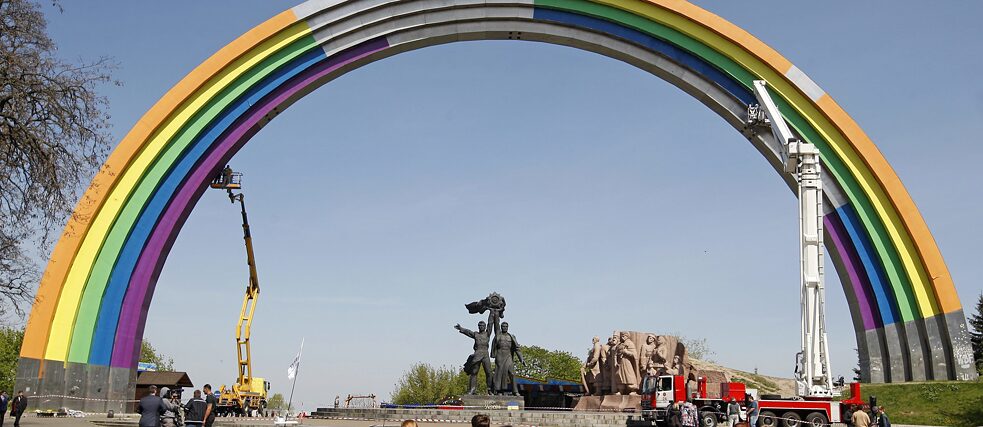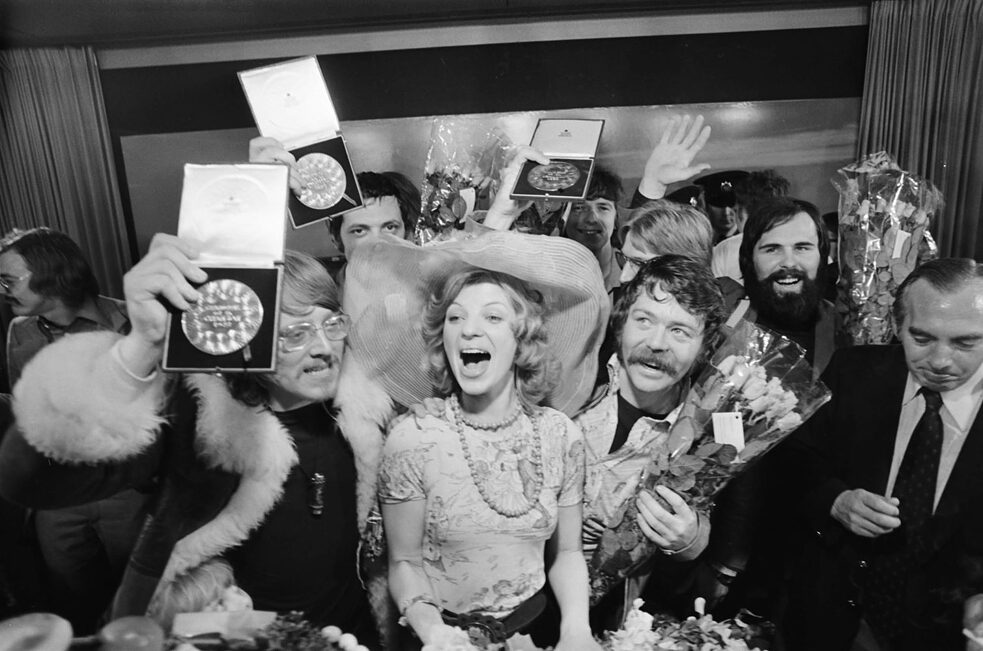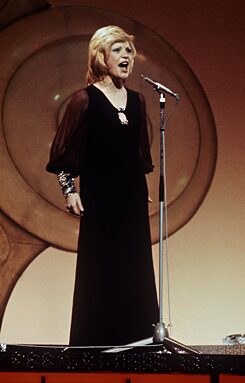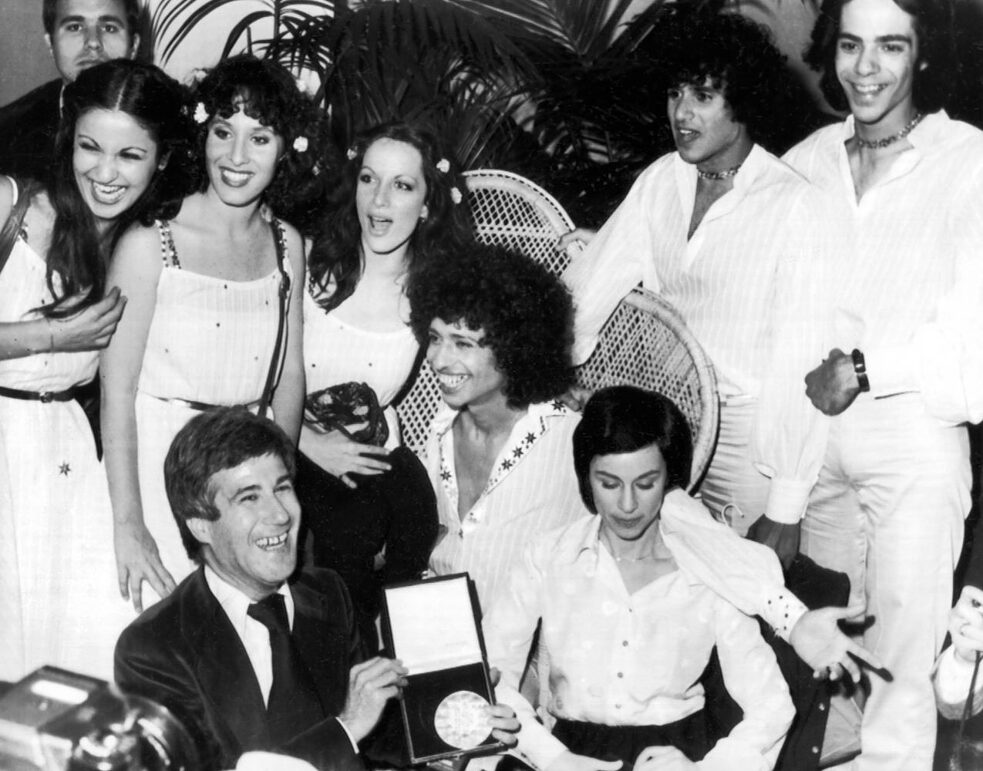Secret pleasures
When the Eurovision Song Contest is a Gay Life Coach

Grand gestures, strange fashions and unlikely dramas: Every generation of gay men rediscovers their happiness at the ESC. Peter Rehberg tells of his childhood.
By Peter Rehberg
For a gay kid growing up in West Germany in the 1970s, there was nothing more exciting than sitting in front of the TV watching the Eurovision Song Contest (ESC). I was instinctively certain then that something was happening right in front of my eyes that affected my future and would change my life forever. The mundane environment of the row-house neighborhood on the outskirts of Hamburg where I grew up had nothing comparable to offer (except my collection of Barbie dolls).
I was amazed, rooted for my favorites and once a year on Saturday night for three hours I was perfectly happy. For weeks afterwards, I hummed the at least three or four great songs that it showcased every year: A-ba-ni-bi, Save Your Kisses for Me, Ding-A-Dong.
 The Dutch band Teach-In after their victory with "Ding-A-Dong" 1975
| Photo: Rob MieremetAnefo (National Archief)
There was no YouTube yet where I could watch each of the performances again – at night before going to sleep – as I sometimes do today. It would take another twelve months before I could experience something equally moving. For me, the Eurovision Song Contest was gay Christmas.
The Dutch band Teach-In after their victory with "Ding-A-Dong" 1975
| Photo: Rob MieremetAnefo (National Archief)
There was no YouTube yet where I could watch each of the performances again – at night before going to sleep – as I sometimes do today. It would take another twelve months before I could experience something equally moving. For me, the Eurovision Song Contest was gay Christmas.
For three hours I was perfectly happy
Here, grand gestures, strange fashions and unlikely dramas were not part of a fancy play with dolls or moments dressing up with my cousin when we slipped into my mother’s discarded evening gowns to present ourselves in our getup to an amused family having coffee and cake. The ESC didn’t show boys or men in women’s clothing yet it was still a kind of drag show. We would never have dreamed in the 1970s that it would later become one of the most important celebrations of queer human rights in Europe.Musical theater, as the queer theorist D. A. Miller writes, offers emotional excess that reflects the emotional state of gay men. Above all, this means two things: embodiments of masculinity and femininity that express their artificiality and feelings that were too big for the real world. Yearningly, intensity could be experienced during the stage show that was far outside the social reality of a homophobic society. For generations of gay men, that wasn’t escapism they allowed themselves over the weekend, but a survival strategy.
Whose feelings actually played a role here?
In Europe, the Eurovision Song Contest was what Broadway was in the US. You saw the sublime divas with their 3-minute dramas, mostly sung in French: Vicky Leandro’s Après toi, Séverine’s Un banc, un arbre, une rue, and above all Marie Miriam’s L’oiseau et l’enfant, France’s winning song in 1977 and still my favorite song from the Eurovision Song Contest today. It wasn’t so easy to say whose feelings actually played a role here. Was it my own yearning for a life that I still lacked the words for and that could only be imagined through the identification of a gay boy with a frequently overweight adult woman on stage singing about love’s sorrows? The Frenchwoman Severine wins the Grand Prix Eurovision de la Chanson 1971 in Dublin with the title "A Bench, a Tree and a Street"
| Photo: UPI © dpa-Bildarchiv
The Frenchwoman Severine wins the Grand Prix Eurovision de la Chanson 1971 in Dublin with the title "A Bench, a Tree and a Street"
| Photo: UPI © dpa-Bildarchiv
Was that my story, the story of a gay kid who was beginning to realize that with his desire he would not easily find love in this world? Or wasn’t it also the story of my mother, whose fortune and misfortune seemed more familiar to me than anything else in the world in the intimacy that we had, which I experienced as a reward and a burden? In gay diva veneration, mothers and sons are always united.
Secret pleasures within the family circle
At any rate, in the ESC format this family affair was as an anchor point of my own development. The gay child sits in the circle of his family in front of the TV and secretly experiences a pleasure that the parents and older siblings have no idea of. He is in the process of reinventing himself and now knows that there is a world in which he doesn’t have to be alone with his feelings. But I had no idea at the age of eight or ten how to get there, into this queer universe, how the pathway from the fascination for the ESC in front of the TV could lead to a gay life in reality.It was also noteworthy that the queer Eurovision world was not a US import. Although music characterized by a global US style had become increasingly noticeable since the 1960s the ESC had its own, very European atmosphere – French chansons, Dutch pop, Italo-disco. As a child, I dreamed of Paris, Amsterdam and Rome; not of New York. Europe was the wide world. I learned French and English with the Eurovision Song Contest before reading Jean Genet and Virginia Woolf. To crisscross the continent with an Interrail ticket for four weeks in the summer when I was 17, or to live in Italy for half a year at age 20 before starting university: Those ideas emerged while I sitting in front of the TV as a child watching the “Grand Prix” as it was still called somewhat romantically then, before Anglicizing became predominant.
For gay men, the desire to travel and sexual identity belong together. An open life is always easier in another place, beyond the social constraints of home. To live as I wanted, I had to leave Germany. I already suspected that as a child. The Grand Prix put me on the right track and awakened my gay longing. My first lovers and friends were French, Spanish and Italian. It wasn’t until much later that could I imagine having a German boyfriend as well. I learned to be gay from the Grand Prix. For that, I remain loyal to the ESC, in spite of a few crises, to this day.
Just for children or repressed adults
Queer researchers ask whether the gay attachment to Broadway – or the Eurovision Song Contest – isn’t actually a sign of oppression; a nostalgic fixation on one’s own misfortune, an artificial world into which one withdraws. Emancipated gay self-awareness would, according to this logic, no longer need the secrecy of cross-gender identification as offered by Broadway or Eurovision. Musicals or Eurovision are just for children – or for repressed adults.The persistent popularity of these genres contradicts this. Even after Stonewall there are multitudes of gay fans of musical theater or the song contest, as the 2019 ESC in Tel Aviv most recently demonstrated. Every generation of gay men rediscovers their happiness at the ESC. Because children grow up queer all the time. Lesbian, gay and trans children continue to be born into a heteronormative world. Thus, the ESC continues to fulfill its function as a queer life coach.
The abrupt end with “Ein bisschen Frieden”
Still, the ESC did not accompany me through every stage of my coming out. During my puberty in the 1980s, the song contest suddenly became embarrassing, like when your own parents become embarrassing. The at times absurd blend of prim television presentation and formulaic music that already sounded outdated on its release had nothing left to offer me. After all, outside the ESC the pop world now had Culture Club’s Boy George, Wham’s George Michael and Madonna. In the 1980s, queerness had arrived in the middle of mainstream pop.Meanwhile, Nicole sang Ein bisschen Frieden at the ESC. That was in 1982 and was the first victory for Germany. The ESC no longer sounded like a departure to a world of adventures waiting for me, but like a return to the bosom of the family. Ein bisschen Frieden was actually a Christmas carol. But a gay teen certainly didn’t yearn to go back under the Christmas tree.
The song contest wasn’t sexy, it was sentimental
The ESC had a lot to offer the gay emotional state. But then it didn’t have much in common with a young adult’s journey of sexual discovery. The song contest wasn’t sexy, it was sentimental. It may have often connoted queer sexuality, but never showed it openly. That came later, in the 2000s, when the acts tried to copy the stage shows of Janet Jackson (Ruslana in 2004 for Ukraine) or Ricky Martin (Sakis Rouvas in 2004 for Greece). After all, the ESC had already outed itself as a queer event in 1998 with the victory of the transgender Israeli singer Dana International.Before that happened, I said goodbye to the televised bliss of my childhood. I now had a real gay life for which I no longer needed dreams of unfulfilled desire. But at night, before falling asleep, I still liked to listen to A-ba-ni-bi or L’Oiseau et l’enfant.
 The Israeli music group Alpha Beta with their singer Izhar Cohen (middle) wins the Grand Prix d' Eurovision de la Chanson in Paris in 1978 with their song "A-Ba-Ni-Bi"
| Photo: UPI Stephane Tavoularis © picture alliance/dpa
The Israeli music group Alpha Beta with their singer Izhar Cohen (middle) wins the Grand Prix d' Eurovision de la Chanson in Paris in 1978 with their song "A-Ba-Ni-Bi"
| Photo: UPI Stephane Tavoularis © picture alliance/dpa